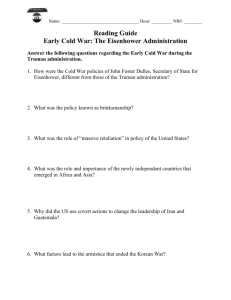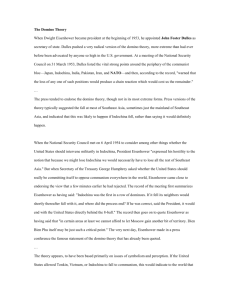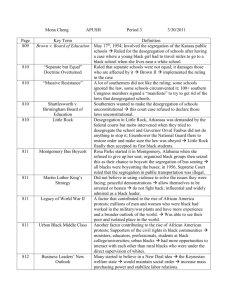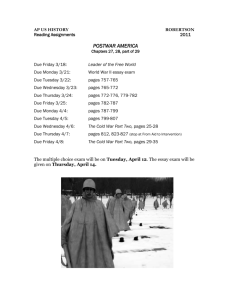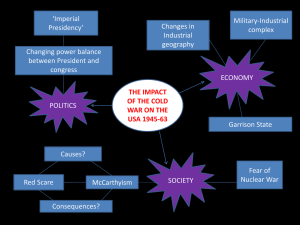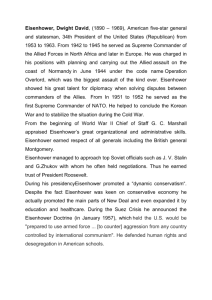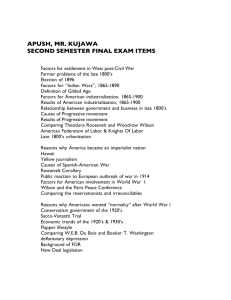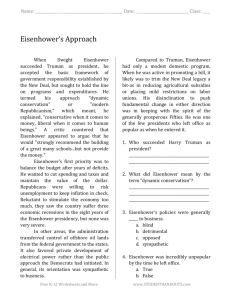V - History Network
advertisement
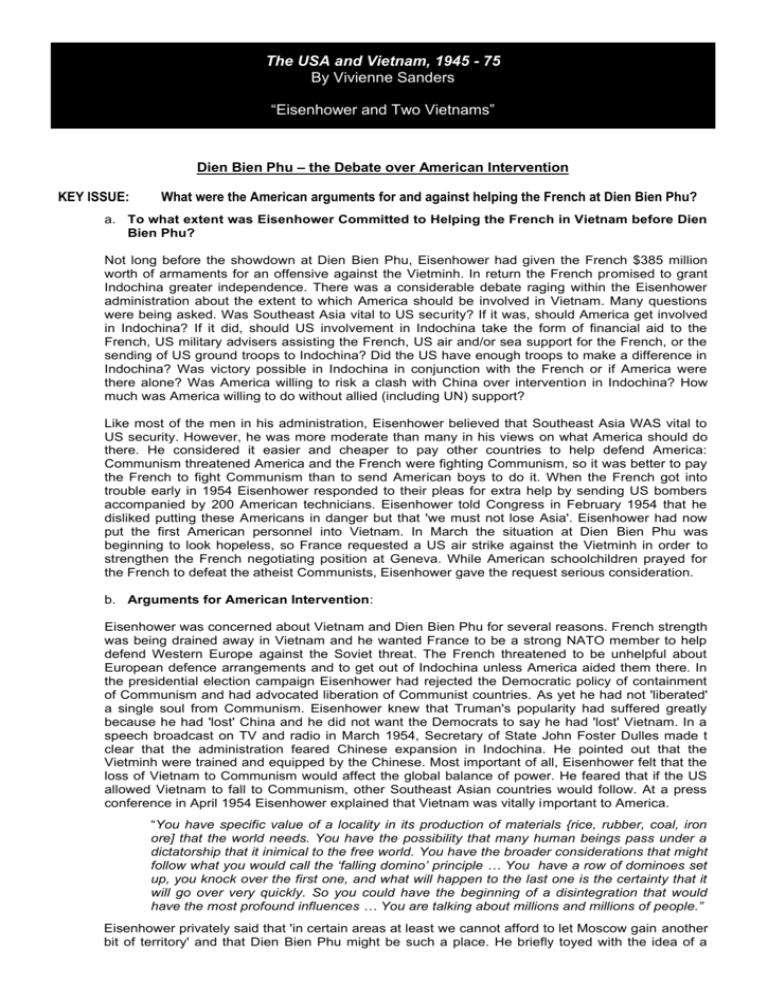
V
The USA and Vietnam, 1945 - 75
By Vivienne Sanders
“Eisenhower and Two Vietnams”
Dien Bien Phu – the Debate over American Intervention
KEY ISSUE:
What were the American arguments for and against helping the French at Dien Bien Phu?
a. To what extent was Eisenhower Committed to Helping the French in Vietnam before Dien
Bien Phu?
Not long before the showdown at Dien Bien Phu, Eisenhower had given the French $385 million
worth of armaments for an offensive against the Vietminh. In return the French promised to grant
Indochina greater independence. There was a considerable debate raging within the Eisenhower
administration about the extent to which America should be involved in Vietnam. Many questions
were being asked. Was Southeast Asia vital to US security? If it was, should America get involved
in Indochina? If it did, should US involvement in Indochina take the form of financial aid to the
French, US military advisers assisting the French, US air and/or sea support for the French, or the
sending of US ground troops to Indochina? Did the US have enough troops to make a difference in
Indochina? Was victory possible in Indochina in conjunction with the French or if America were
there alone? Was America willing to risk a clash with China over intervention in Indochina? How
much was America willing to do without allied (including UN) support?
Like most of the men in his administration, Eisenhower believed that Southeast Asia WAS vital to
US security. However, he was more moderate than many in his views on what America should do
there. He considered it easier and cheaper to pay other countries to help defend America:
Communism threatened America and the French were fighting Communism, so it was better to pay
the French to fight Communism than to send American boys to do it. When the French got into
trouble early in 1954 Eisenhower responded to their pleas for extra help by sending US bombers
accompanied by 200 American technicians. Eisenhower told Congress in February 1954 that he
disliked putting these Americans in danger but that 'we must not lose Asia'. Eisenhower had now
put the first American personnel into Vietnam. In March the situation at Dien Bien Phu was
beginning to look hopeless, so France requested a US air strike against the Vietminh in order to
strengthen the French negotiating position at Geneva. While American schoolchildren prayed for
the French to defeat the atheist Communists, Eisenhower gave the request serious consideration.
b. Arguments for American Intervention:
Eisenhower was concerned about Vietnam and Dien Bien Phu for several reasons. French strength
was being drained away in Vietnam and he wanted France to be a strong NATO member to help
defend Western Europe against the Soviet threat. The French threatened to be unhelpful about
European defence arrangements and to get out of Indochina unless America aided them there. In
the presidential election campaign Eisenhower had rejected the Democratic policy of containment
of Communism and had advocated liberation of Communist countries. As yet he had not 'liberated'
a single soul from Communism. Eisenhower knew that Truman's popularity had suffered greatly
because he had 'lost' China and he did not want the Democrats to say he had 'lost' Vietnam. In a
speech broadcast on TV and radio in March 1954, Secretary of State John Foster Dulles made t
clear that the administration feared Chinese expansion in Indochina. He pointed out that the
Vietminh were trained and equipped by the Chinese. Most important of all, Eisenhower felt that the
loss of Vietnam to Communism would affect the global balance of power. He feared that if the US
allowed Vietnam to fall to Communism, other Southeast Asian countries would follow. At a press
conference in April 1954 Eisenhower explained that Vietnam was vitally important to America.
“You have specific value of a locality in its production of materials {rice, rubber, coal, iron
ore] that the world needs. You have the possibility that many human beings pass under a
dictatorship that it inimical to the free world. You have the broader considerations that might
follow what you would call the ‘falling domino’ principle … You have a row of dominoes set
up, you knock over the first one, and what will happen to the last one is the certainty that it
will go over very quickly. So you could have the beginning of a disintegration that would
have the most profound influences … You are talking about millions and millions of people.”
Eisenhower privately said that 'in certain areas at least we cannot afford to let Moscow gain another
bit of territory' and that Dien Bien Phu might be such a place. He briefly toyed with the idea of a
lightning American air strike - in unmarked planes because 'we would have to deny it for ever'.
c. Arguments against American Intervention:
Not every influential American agreed that something should be done about Vietnam. Some disliked
the domino theory, doubting whether the loss of a relatively small country to Communism would
cause the loss of others. Some of the military and the Secretary of Defence felt that Indochina was
'devoid of decisive military objectives' and that any US intervention there would be pointless, 'a
serious diversion of limited US capabilities'. One vice-admiral insisted that 'partial' involvement
through air and sea forces alone would be a delusion. 'One cannot go over Niagara Falls in a barrel
only slightly,' he said. Whilst he was commander of NATO Eisenhower himself had said that 'no
military victory is possible in that kind of theatre' and in the early 1960s he would write in his
memoirs that 'the jungles of Indochina would have swallowed up division after division of US
troops'. He pointed out the dangerous possibility that the US could find itself fighting Communists
everywhere and felt he could not put US troops on the Asian mainland again just one year after he
had gained massive popularity by getting them out of Korea. Even if he had wanted to send US
troops, there were none readily available. The Republicans' 'new look' defence policy emphasised
nuclear weaponry at the expense of manpower. Many Americans were uncertain about the wisdom
of being too closely entangled with the French in Indochina. Eisenhower privately described the
French as 'a hopeless, helpless mass of protoplasm'! The French themselves disliked the American
conditions for involvement. France did not want to grant total independence to Vietnam and then
carry on fighting there under a US commander. Eisenhower wrote in his memoirs that 'the strongest
reason of all' for America to stay out
“is the fact that among all the powerful nations … the United States is the only one with a
tradition of anti-colonialism … an asset of incalculable value … The moral position of the
United States was more to be guarded than … all of Indochina.”
He clearly recognised the danger of replacing French colonialism with American colonialism.
Perhaps more importantly, Eisenhower and Dulles tried but failed to get the British support that
Congress required before they would approve American military intervention. Prime Minister
Churchill said the struggle was not winnable and might trigger off World War Three. Ironically, one
unenthusiastic senator was Lyndon Johnson. Faced with all this uncertainty, Eisenhower decided
against direct American intervention in Vietnam. Without American intervention, the French were
doomed to defeat at Dien Bien Phu. That defeat would ensure that the French government and
people were finally ready to give up and get out of Indochina.
